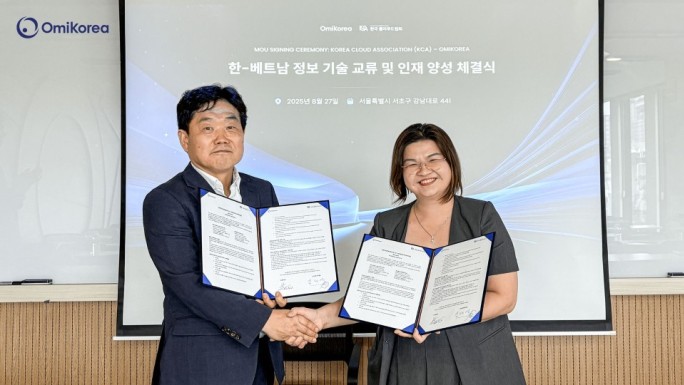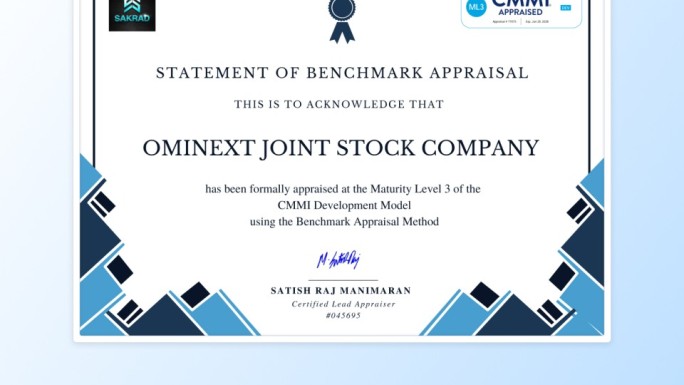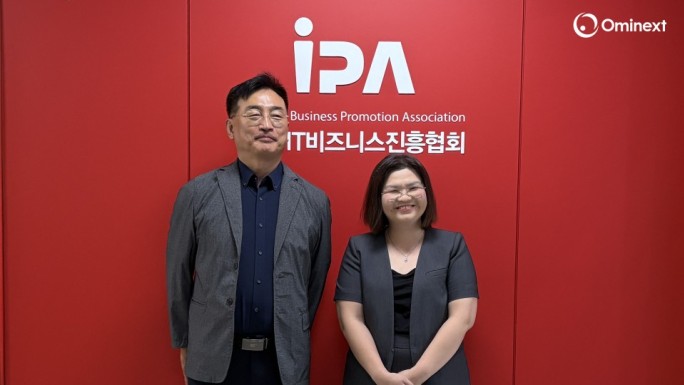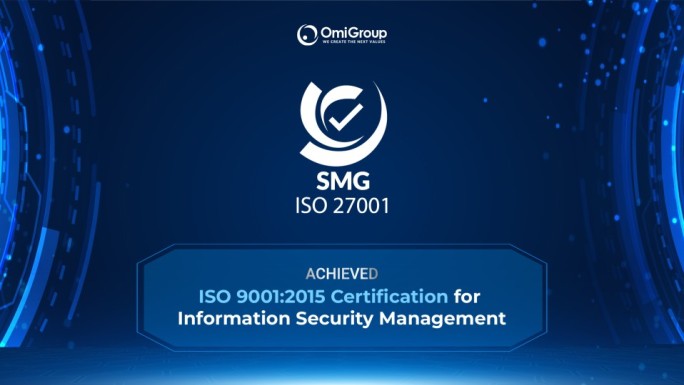[Recap] Omikorea Webinar: What Are the 6 Secrets to 'Success' in Vietnam IT Outsourcing?
IT outsourcing (ITO) is rapidly emerging as a core strategy for Korean IT companies seeking both cost efficiency and specialized expertise. Among outsourcing destinations, Vietnam is being hailed as a "rising star" with immense growth potential. In particular, Vietnam's software outsourcing (ITO) market has been growing rapidly, currently ranking 6th globally. With a talent pool of over 500,000 IT engineers and costs at about 70% of Korea’s, Vietnam has become an attractive destination for Korean companies searching for efficient and economical tech solutions.
In line with this trend, Omikorea Solution, a subsidiary of OmiGroup, successfully hosted a webinar on the 8th titled: “Vietnam IT Outsourcing Strategy for Cost Optimization and Quality Maximization.”
This webinar presented key strategies for companies to go beyond the goal of simply “outsourcing cheaply” and instead achieve “high-quality and successful projects,” attracting the attention of industry professionals.
The session provided an in-depth look at the current state and future outlook of the Vietnamese ITO market and delivered valuable insights through real case studies analyzing both success and failure factors. Notably, Yoon Yoon-seok, Head of Domestic Business at SML Genetree, shared lessons from his first ITO collaboration with Omikorea. Following that, Yeoreum Park, General Manager at Omikorea, introduced six key elements for improving project quality and achieving success beyond just cost savings.
So, let’s summarize the 6 golden strategies for successul ITO collaboration:
1. Bridge System Engineer (BrSE): The Key to Overcoming Language and Cultural Barriers
In global collaboration, BrSEs play a crucial role in overcoming language and cultural gaps and enabling effective communication. More than translators, BrSEs need technical knowledge and a deep understanding of Korean work processes and culture to accurately convey customer requirements. Strong BrSE skills are critical to clearly defining requirements at the start, preventing uncontrolled scope creep.
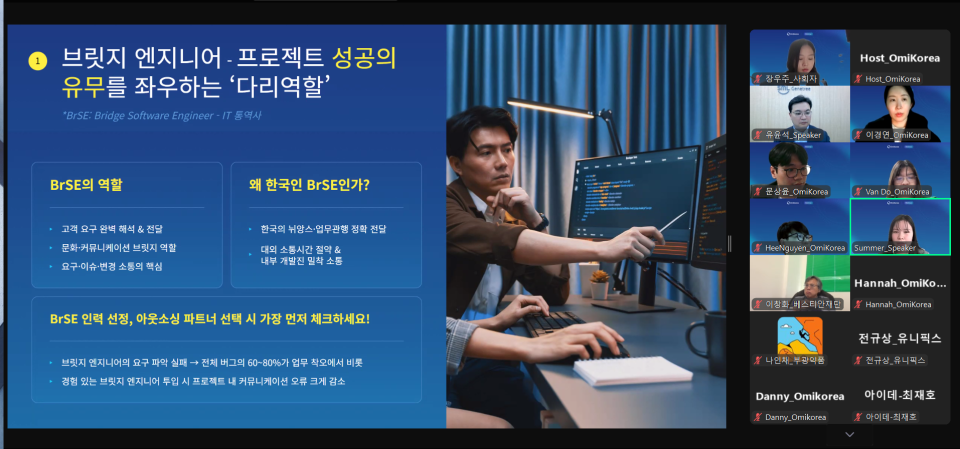
2. The First Month of the Project: Seize the “Golden Time”!
The first month after signing the contract is the “golden time” that lays the foundation for project success. It is vital to create a detailed RFP (Request for Proposal) and establish a structured onboarding process. Rapid knowledge transfer, environment setup, and collaboration tool training can help minimize early confusion and accelerate team adaptation.
3. Communication & Collaboration: Preventing Technical Debt
Unresolved issues during the project can accumulate into technical debt, severely affecting speed and quality. Omikorea flexibly applies Agile methodologies, holds regular sprint reviews and daily scrums, and actively uses tools like Jira and Redmine to create a transparent, efficient communication environment and resolve issues promptly.
4. Overcoming Time Zone & Cultural Gaps: Strengthening Global Collaboration
Time differences and cultural mismatches are common challenges in international ITO. To address this, both parties should establish a shared “Golden Hour” for real-time collaboration and provide training on Korean corporate culture. This enables teams to clearly understand partner expectations and communicate effectively through honest, direct feedback. With only a two-hour time difference and high adaptability to Korean work styles, Vietnamese ITO partners are becoming increasingly trusted by Korean IT companies.
5. Ensuring Transparency: The Foundation of Trust
Trust is built on transparent sharing of all project-related updates. Omikorea understands the importance of openly discussing and carefully reviewing all changes—whether timeline shifts, cost increases, or requirement changes (CRs)—to maintain mutual trust throughout the project.
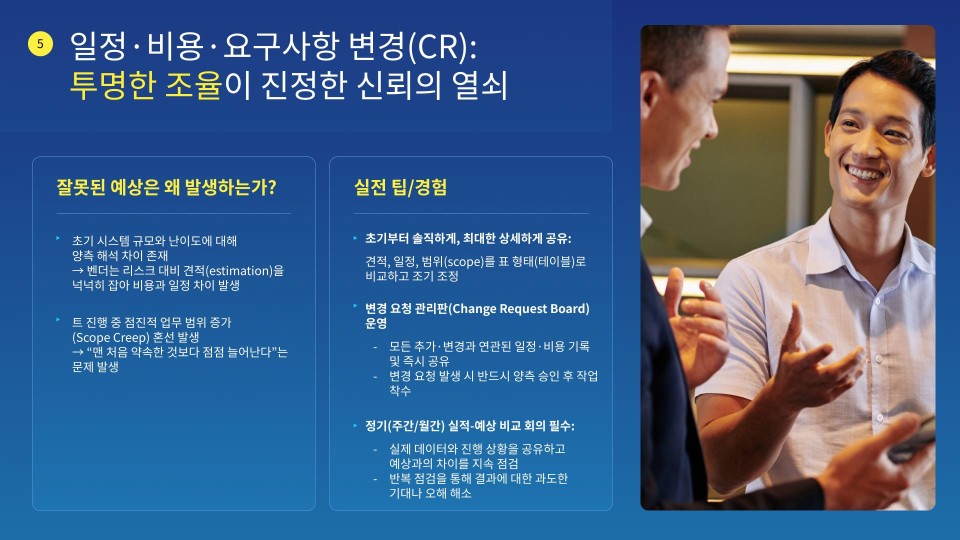
6. Cross-Validation: Ensuring System Quality and Reliability
To ensure deliverables meet quality and operational needs, cross-testing should be conducted. It’s important not to rely solely on external vendors for QA but to designate responsible personnel for on-site testing and acceptance to meticulously verify project outcomes.
Through this webinar, Omikorea emphasized that ITO is not merely a cost-cutting tool but a strategic asset that enhances competitiveness and drives business growth. For successful ITO, all aspects from enhancing BrSE capabilities and structured onboarding to transparent communication, cultural integration, and cross-validation must be considered holistically. These insights were met with an enthusiastic response from attendees.
